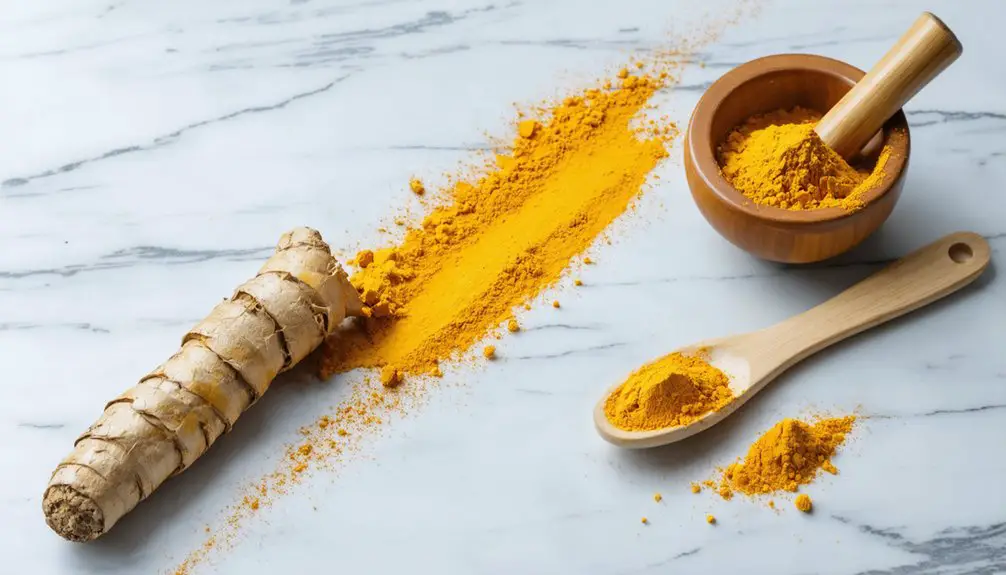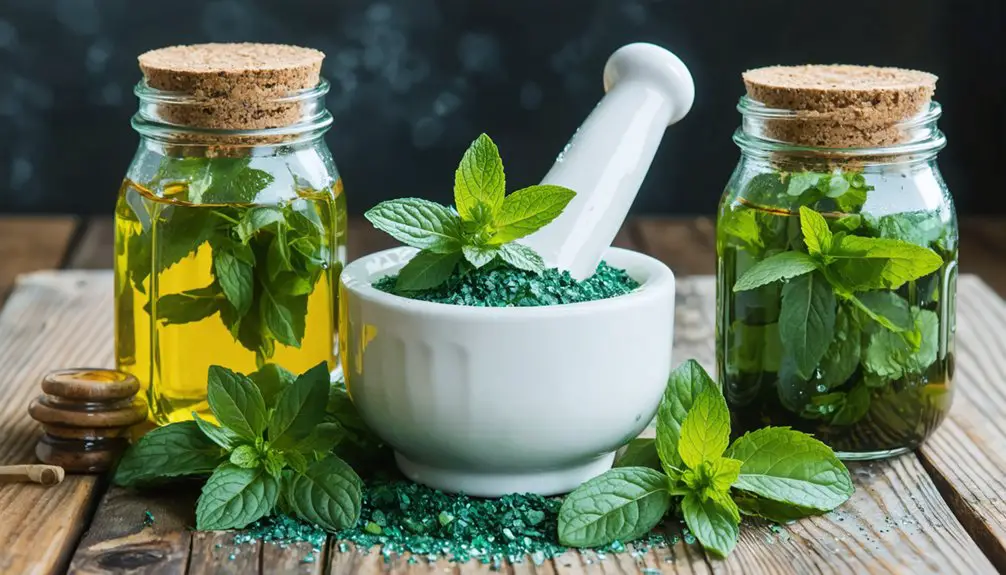While turmeric can benefit your oral health through its anti-inflammatory and antibacterial properties, it won’t actually whiten your teeth. You’ll find it’s effective against gingivitis and plaque when used as a gentle paste or rinse for 2 minutes, but the yellow pigments may temporarily stain tooth surfaces. For genuine whitening results, you’ll want to evaluate proven alternatives like professional treatments or over-the-counter peroxide products. Discover how to maximize turmeric’s true dental benefits while achieving your desired smile goals.
Key Takeaways
- Turmeric’s antibacterial properties reduce plaque buildup, making teeth appear brighter through improved oral hygiene.
- Mix turmeric powder with coconut oil to create a gentle paste and apply for no more than 2 minutes.
- Yellow pigments in turmeric act as natural plaque detectors, helping identify areas needing better cleaning.
- Regular turmeric use helps maintain oral health through anti-inflammatory properties but doesn’t chemically whiten teeth.
- Consider professional whitening treatments for significant color improvement, as turmeric provides minimal whitening effects.
Understanding Turmeric’s Impact on Dental Health
While turmeric has gained popularity as a culinary spice, its remarkable impact on dental health stems from its active compound curcumin.
Turmeric’s power as a dental health ally comes from curcumin, taking this golden spice beyond the realm of cooking.
You’ll find that turmeric benefits extend far beyond the kitchen, offering powerful support for your oral hygiene routine through multiple mechanisms.
When you incorporate turmeric into your dental care, you’re tapping into its natural anti-inflammatory properties that help combat gingivitis and periodontitis.
It’s particularly effective when applied topically as a paste with salt and mustard oil, or used as a mouth rinse.
Ancient Ayurvedic medicine practitioners first discovered turmeric’s healing properties for oral health thousands of years ago.
The spice’s antibacterial qualities fight oral pathogens while reducing microbial counts in your mouth.
What’s more, turmeric’s yellow pigment serves as a natural plaque detector, making it easier for you to identify areas that need extra attention during cleaning.
The daily use of turmeric products should be combined with regular dental care to achieve optimal oral health results.
The Science Behind Turmeric and Tooth Color
Although turmeric has gained attention for its potential teeth-brightening properties, the scientific evidence reveals a complex relationship between this spice and tooth color. The curcumin properties in turmeric demonstrate antibacterial effects that may reduce plaque buildup, indirectly affecting tooth brightness. However, its enamel interaction isn’t straightforward. The American Dental Association confirms there is no scientific evidence supporting turmeric’s whitening abilities.
- Turmeric’s yellow-orange pigments can actually stain tooth surfaces rather than whiten them.
- While it fights harmful bacteria like Streptococcus mutans, this only affects surface cleanliness.
- Clinical studies show turmeric doesn’t penetrate or chemically whiten tooth enamel.
- Any perceived brightening likely comes from plaque reduction rather than true whitening effects.
Its antioxidant action helps maintain natural tooth color by neutralizing harmful free radicals in the mouth. Understanding these scientific facts helps you make informed decisions about using turmeric for dental care, as its benefits lie more in oral health than cosmetic improvement.
Comparing Natural Vs Commercial Whitening Methods
Since natural and commercial teeth whitening methods differ considerably in their effectiveness, understanding their key distinctions can help you make an informed choice.
While natural ingredients like turmeric have gained popularity, studies show they provide minimal whitening benefits and may actually stain teeth with prolonged use.
Commercial whitening products, containing peroxide-based compounds, effectively break down stains both on and within tooth surfaces.
Don’t fall for whitening myths about natural remedies like activated charcoal or turmeric offering comparable results to professional treatments.
Though natural methods are generally less abrasive to enamel, they lack the chemical agents needed for significant whitening.
Most results for turmeric teeth whitening are based on anecdotal evidence rather than scientific research.
The American Dental Association has not endorsed turmeric as an effective whitening agent due to lack of scientific support.
If you’re helping clients achieve brighter smiles, recommend professionally supervised whitening treatments that balance safety and effectiveness while incorporating desensitizing agents to minimize potential side effects.
Safe Practices for Using Turmeric in Oral Care
Because turmeric’s potential risks in oral care can outweigh its benefits, following safe practices becomes vital for anyone considering its use.
Safe application of turmeric in oral care is crucial, as improper use can negate any potential benefits and cause unwanted effects.
While turmeric benefits may include natural antibacterial properties, proper application techniques are essential to prevent damage to your teeth and gums.
- Apply turmeric paste gently using a soft toothbrush or fingertip, avoiding excessive pressure that could harm your enamel.
- Limit contact time to no more than 2 minutes, and rinse thoroughly with water afterward.
- Use only small amounts of turmeric powder mixed with safe carriers like coconut oil.
- Monitor your oral health closely for signs of sensitivity, irritation, or staining.
Scientific research shows that no proven effectiveness exists for turmeric as a teeth whitening agent.
Unlike proven whitening methods that use hydrogen peroxide, turmeric has limited scientific evidence supporting its teeth whitening capabilities.
If you experience any adverse effects, discontinue use immediately and consult your dentist.
Remember that traditional oral hygiene practices remain your foundation for maintaining peak dental health.
Evidence-Based Alternatives for a Brighter Smile
While natural remedies like turmeric have gained popularity, scientifically proven teeth whitening methods offer more predictable and lasting results.
Over-the-counter options provide an affordable starting point for those new to teeth whitening.
If you’re seeking alternatives beyond turmeric benefits and natural whitening approaches, consider professional treatments that use peroxide-based compounds for significant improvements. High water content gels prevent tooth dehydration during the whitening process.
You’ll find several evidence-based options: in-office whitening sessions can brighten your teeth dramatically in just 30-60 minutes, while custom-fitted trays with carbamide peroxide gels offer gradual whitening over 1-4 weeks.
For convenience, whitening strips applied daily can lighten teeth by 1-2 shades within two weeks.
Professional treatments often include protective ingredients like potassium nitrate and fluoride to minimize sensitivity and strengthen enamel.
These methods can maintain results for up to two years with proper care.
Frequently Asked Questions
Can Turmeric Stains on Teeth Be Reversed if They Occur?
90% of turmeric stains can be reversed through proper turmeric removal techniques. You’ll need immediate brushing, professional dental whitening products, or dentist-supervised treatments to effectively eliminate yellow discoloration from your teeth.
How Does Turmeric Interact With Existing Dental Work Like Crowns or Veneers?
You’ll want to avoid turmeric with dental restorations, as it can stain crowns and veneers, increase surface roughness, and cause discoloration that’s hard to remove from your dental work.
Will Turmeric Affect the Effectiveness of Prescription Dental Medications?
You should consult your dentist before using turmeric with prescription medications, as turmeric interactions could affect drug metabolism and effectiveness, though there’s limited evidence of direct negative impacts on dental prescriptions.
Does Combining Turmeric With Other Natural Ingredients Improve Whitening Results?
Combining turmeric with natural remedies won’t considerably improve teeth whitening results. You’ll find that any perceived benefits come mainly from mechanical abrasion rather than actual turmeric benefits or chemical whitening effects.
Can Children or Pregnant Women Safely Use Turmeric for Dental Care?
You can safely use turmeric for dental care while pregnant or with children, but consult your dentist first. Keep application minimal, topical-only, and supervised. Avoid ingesting large amounts during pregnancy.
References
- https://www.stonestreetdental.com/blog/can-turmeric-really-whiten-teeth/
- https://pmc.ncbi.nlm.nih.gov/articles/PMC9645194/
- https://www.dentalhealthandwellnessboston.com/blog/2024/10/25/can-turmeric-be-used-as-a-teeth-whitening-treatment/
- https://www.mychoicedentistry.com/turmeric-teeth-whitening-does-it-really-work/
- https://pmc.ncbi.nlm.nih.gov/articles/PMC10024105/
- https://pmc.ncbi.nlm.nih.gov/articles/PMC10165051/
- https://pmc.ncbi.nlm.nih.gov/articles/PMC3633300/
- https://www.newagedental.mx/blog/turmeric-for-oral-health/
- https://www.webmd.com/oral-health/what-to-know-turmeric-dental-care
- https://www.nature.com/articles/s41407-021-0708-7



